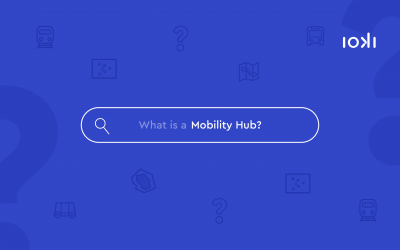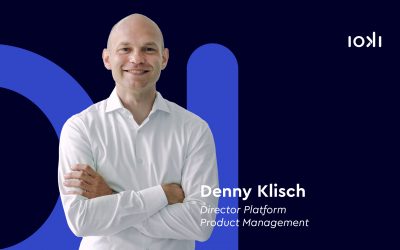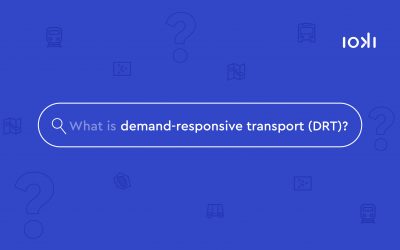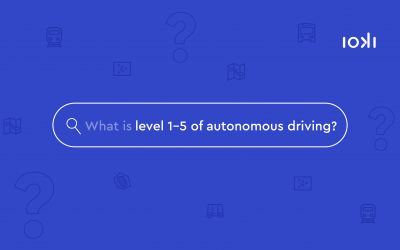What is … a Mobility Hub?
Mobility Hubs, also known as Mobility stations, are publicly accessible locations where various modes of transport and sharing services converge. These can be S-Bahn (suburban train) and subway stations in an urban context, or even a bus stop in the countryside where rental bikes are available or important bus routes intersect. At these stations, people can easily switch from one mode of transport to another. Mobility hubs promote efficient and sustainable mobility by offering various mobility services, otherwise known as Mobility-as-a-Service (MaaS). The concept can be expanded from a simple bus stop to large Mobility Hubs, for example, with a combination of on-demand transport, car sharing stations, or e-scooters.
Perspectives from Denny Klisch
Denny is our Director Platform Product Management and an iokian from the start. Since 2017, he has supported the development of our on-demand platform in various roles. Denny is now responsible for Platform Product Management at ioki and regularly hosts Product Meetups in Frankfurt. For our “Perspectives from …” series, he returns to his roots and explains what the ridepooling approach at ioki is all about. If you want to know more about ridepooling, we recommend our blog post “What is ridepooling? Have fun reading!
What does the mobility of the future look like? ioki at Zukunft Nahverkehr and IAA Mobility
At the beginning of September, two events revolved around this question: Zukunft Nahverkehr (engl. “Future of Public Transport”) by DB Regio AG in Berlin and the IAA Mobility in Munich. Our mobility experts from ioki were present at both events and look back on days full of inspiration.
PERSPECTIVES from Dennis Schöne
Two years ago, the city of Gronau in the Münsterland region completely switched its scheduled bus service to a tariff-integrated DRT concept. Since then, the so-called G(ronau)-Mobil has been operating 130 stops flexibly and after pre-booking, significantly more than its predecessor “StadtBus” (“city bus”). But how do the services catch on with the population and shouldn’t DRT services complement existing scheduled services, not replace them? We asked one of the facilitators of the G-Mobil: Dennis Schöne, who works in the traffic management of Regionalverkehr Münsterland GmbH, the service’s operator.
What is … demand-responsive transport (DRT)?
Demand-responsive Transport (DRT) refers to a technology-based and shared mobility service. Instead of following predefined routes, timetables and fixed stops, on-demand services follow no timetable, also make virtual stops and operate on different routes. The vehicles operate on demand and when needed. Booking is usually done via app but can also be done via phone call and/or in the web browser. DRT combines the reliability of conventional public transport with the flexible availability of private cars.
Mobility Turn, now! Mobility of the Future in Hamburg
This time we’re off to the far north, or more precisely to the Hanseatic City of Hamburg. The port metropolis on the Elbe is a pioneer in Germany for digital, climate-friendly and flexible mobility.
PERSPECTIVES from Maximilian Hillmeier
Since December 2021, EMMI-MOBIL has been driving with two electric minibuses through the municipal area of Bad Hindelang. By doing the service is supplementing the existing public transport service as an on-demand service in order to offer an attractive flexible and free-of-charge mobility solution, especially for the guests of the Allgäu holiday region. A good reason for ioki insights to ask Maximilian Hillmeier, tourism director of Bad Hindelang, how demand-responsive mobility can be successfully established as part of a sustainable tourism strategy and how the future of mobility in holiday regions can look like.
Mobility on holiday – first & last mile in tourist regions
Holidays without mobility are only possible on staycations, because no matter whether it’s a day trip, an annual holiday or a long-term trip: Travelling means being mobile. In order to achieve the climate protection goals and to advance the traffic turnaround, tourist traffic should also be critically examined, because Germans like to travel a lot.
PERSPECTIVES from Tanja Wiesenthal
As Senior Expert Shared Automated Mobility at ioki, Tanja Wiesenthal is already working today on the future of tomorrow. ioki has been one of the pioneers of autonomous driving in public transport since the beginning and covers all the necessary processes for driverless public transport, from app development and the algorithm for ridepooling to operational platform op-eration. Tanja Wiesenthal worked for SAP before and has been working for ioki since 2020, where she is responsible for the procedural and technical conception of ridepooling with au-tonomous vehicles at ioki.
Autonomous vehicles: turning point in European regional and local transport
Autonomous mobility is no longer a utopia; it is already reality and a key technology in today’s world. Worldwide, and especially in Europe, research and testing are being carried out on autonomous mobility – this holds great potential in terms of improving individual mobility thanks to increasingly efficient services while also providing a way of reducing private transport.
What is … level 1-5 of autonomous driving?
Autonomous driving has been considered one of the major trends in the mobility industry for years. According to a representative survey conducted by the digital association Bitkom in 2021, 99.8 percent of respondents can imagine using an autonomous means of transport*. But what does it actually mean when car manufacturers send the first systems for highly automated driving on the road at level 3 and level 4 autonomous shuttles reinforce public transport in Germany on demand from 2023 onwards?
PERSPECTIVES from Fabian Heil, PostBus Ltd.
Since the beginning of 2023, PostBus Ltd* has been offering its employees in Berne demand responsive employee transport. It’s about time for ioki insights to take a look at how sustainable and sensible mobility for employees can look in Switzerland. Fabian Heil, Head of Market Launch at PostBus, was available to talk to us.












